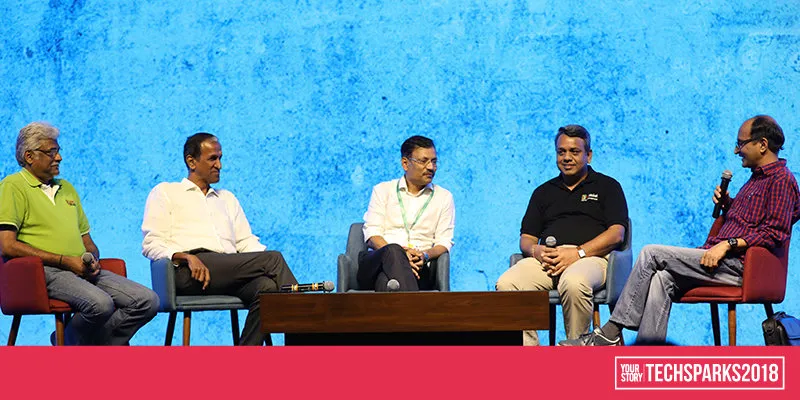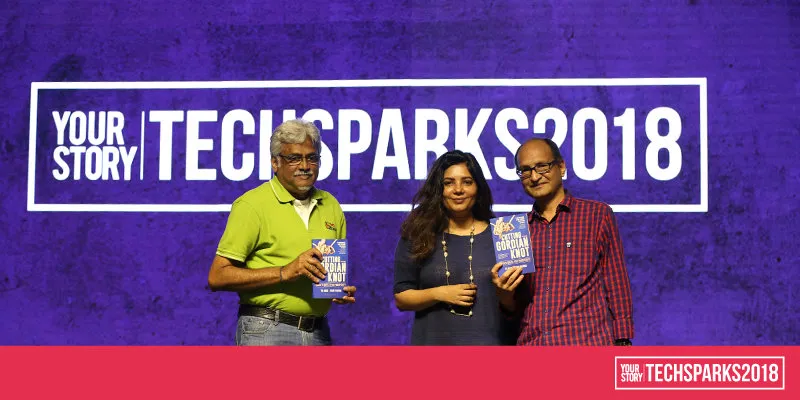How BigBasket drove the grocery ecommerce business before it became a buzzword
At the ninth edition of YourStory's TechSparks, the founders and top brass of BigBasket graced the stage together for the first time to share their story as second-time entrepreneurs and creators of one of the largest online grocery stores.
It was a rare treat, indeed, to see the otherwise media-shy founders of BigBasket come together to address a packed audience of budding entrepreneurs about their journey.
For the veterans in the on-demand grocery and ecommerce market, this is their second foray into entrepreneurship. In 1999, Hari Menon, V. S. Sudhakar, Abhinay Choudhari and Vipul Parekh had co-founded Fabmart, which pivoted from an online market to a physical grocery business a decade ago.

Addressing a packed hall in the second session of the first day of TechSparks, in a panel moderated by T.N. Hari, HR Head of BigBasket, Hari Menon says,
“We thank Citibank for helping us start Fabmart in 1999.”
In 2011, the four co-founded online grocery platform BigBasket that has successfully busted the myth that 'ecommerce will not work in FMCG'. The company has grown slowly and steadily, with negligible discounts and a strong business model.
Today, the company operates in 25 cities, including smaller cities like Surat, Mysore, and Coimbatore. According to Hari, there is no intention to expand further right now; he expects the company will grow gross monthly sales from Rs 200 crore a month currently to Rs 500 crore a month by March 2019 from these 25 cities.
The funding drama
When BigBasket started in 2011, it was probably among the few startups at the time to have raised the highest first round of funding, at $10 million. In February this year, BigBasket raised $300 million in its series E funding from existing investors Sands Capital, International Finance Corporation, and Abraaj Group. But this round of funding was led by Alibaba making it the e-grocer's single largest shareholder. With a core team that already understood its complexities, it was a no-brainer for investors. But the founders believe that funding is also one of the most important lessons they’ve learnt. Sudhakar says,
“The level of funding is important for growth. I have learnt that when money is there in the market, go ahead and raise it. Use money wisely but if you are in a growth-oriented business, take as much as you can."
Drive fundamental value systems
Equally important is the people you work with and the relationship you share with them, says Sudhakar. To make his case, Sudhakar says that if you’re a cricketer and you are running between wickets, you need to know whether the other player also would run along at the same pace.
"It is exactly the same with us. The four of us believe and completely trust in each other," he adds.
Consistency is also key, he said, particularly when your business caters to an average basket size of just 23 items and the same basket is ordered over 30 times a year. And Sudhakar believes "consistency" is achieved through building processes in place.
And yet, he adds that in India, “We have an element of individuality in everything that we do, so training becomes critical. For example, the tags that get cut when we deliver products need to be picked up and brought back. It’s a small thing, but most Indian people don’t wear footwear and that tag can hurt their feet."
BigBasket wants customers to believe that it cares. If a customer calls the customer service to address an issue, the team ensures that a human being answers on the other side in 10 seconds or “one of us will take the call if needed,” says Sudhakar.

Understanding the O2O business
Yet, building the balance between discounts and unit economics is important. Vipul says that you can’t shy away from it. But the place where you deploy it becomes extremely important.
“A business needs to build a model that handles variable costs in short-term, and fixed costs in the long run or there will be a problem,” says Vipul.
Two startups may look the same but where they spend the money is important to understand. “Capital doesn’t give you excuse to get away without having a model,” says Vipul.
But today, the world of grocery is becoming hotter, and with Amazon acquiring Whole Foods and More, businesses are looking at the grocery space. Both Amazon and Alibaba have acquired grocery startups. Even in the US, grocery is the largest market. It needs points of delivery and the selection varies by geography because of which you need to build fulfillment closer to customers.
According to Sudhakar, "Starting from scratch is a pain so Amazon is acquiring." Everyone wants to reach out to customers and maximise their share of customers. The game, therefore, is working on an O2O model.
What will continue to keep BigBasket relevant?
Hari says, “The biggest differentiation we are building is a business of fresh produce. Grocery customer service and problem-solving is very important, and we are focussing on that. Also, our business is highly dependent on people. 75 percent of our workers are blue-collared, and our focus is also on helping them grow and be more productive.”
From day one, BigBasket has focused on fresh produce, one of the most difficult segments to crack. The team felt that the category of fresh produce would make the brand, as people buy it four times a month.
There still is a long way to go. The blue-collared workforce needs to be trained and motivated to be productive.
“There needs to be a focus on how they grow along with us, understand technology and how important they actually are. Even if five people don’t come one morning, deliveries and orders become tougher,” says Hari.
To further help people build this strong bridge and create a seamless technology base for all startups, TN Hari and Hari Menon also launched their book, Cutting the Gordian Knot, published by Bloomsbury, at the end of the discussion.
YourStory's annual extravaganza TechSparks brings together the best and the brightest from the startup ecosystem, corporate world, policy makers, and of course, the investor community. Over the years, it has grown to become India's most loved tech and startup platform for knowledge sharing and networking. The ninth edition of TechSparks also marks YourStory's 10th anniversary. A big thank you for all your support over the years and keep reading and watching YourStory.








